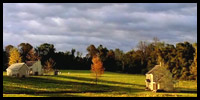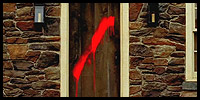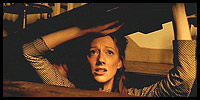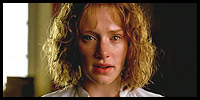
 |
|
The Village (2004) Cast: Bryce Dallas Howard, Joaquin Phoenix, William Hurt, Adrien Brody, Sigourney Weaver, Judy Greer, Brendan Gleeson, Michael Pitt, Cherry Jones, Celia Weston, Frank Collison, Fran Kranz, Jesse Eisenberg, Jayne Atkinson, Charlie Hofheimer, Liz Stauber, M. Night Shyamalan 2004 – 107 minutes Rated: Reviewed by Dustin Putman, July 30, 2004.  In my review of 2002's "Signs," I wrote that filmmaker M. Night Shyamalan had finally cemented his place as one of the great filmmakers working today, a Steven Spielberg or Alfred Hitchcock of the new millennium with the talent to mix deeply felt emotions and sharply written characters with an unsettling, "less-is-more" visceral impact. Also known for the revelations he carefully constructs at the ends of his movies—1999's "The Sixth Sense," 2000's "Unbreakable," and "Signs"—that force the viewer to look at what they have just watched from an entirely different, more enlightened angle, M. Night Shyamalan seemed to be on a creatively sumptuous, financially illustrious roll.
In my review of 2002's "Signs," I wrote that filmmaker M. Night Shyamalan had finally cemented his place as one of the great filmmakers working today, a Steven Spielberg or Alfred Hitchcock of the new millennium with the talent to mix deeply felt emotions and sharply written characters with an unsettling, "less-is-more" visceral impact. Also known for the revelations he carefully constructs at the ends of his movies—1999's "The Sixth Sense," 2000's "Unbreakable," and "Signs"—that force the viewer to look at what they have just watched from an entirely different, more enlightened angle, M. Night Shyamalan seemed to be on a creatively sumptuous, financially illustrious roll.
 Shyamalan's near-perfect filmography record since hitting it big five years ago finally catches its first snag with "The Village," a supernaturally-tinged horror story with a whopper of a thought-provoking twist. On its own, the true colors of the "Village," gradually discovered as the conclusion approaches, work with evocative bravado, but the way it is handled within the surprisingly muddy screenplay (also by Shyamalan) feels strictly like a cheat. The writer-director-producer's previous trio of motion pictures were so meticulously laid out and woven that there was no gap in consistency or willful plausibility. From the ensemble of characters and relationships, to the performances, to the story, to the visual mastery, to the genuinely earned scares, to the eventual and natural uncovering of the truth, Shyamalan's control over each of his past cinematic efforts was unfailingly in high gear. "The Village" holds no such scrutiny.
Shyamalan's near-perfect filmography record since hitting it big five years ago finally catches its first snag with "The Village," a supernaturally-tinged horror story with a whopper of a thought-provoking twist. On its own, the true colors of the "Village," gradually discovered as the conclusion approaches, work with evocative bravado, but the way it is handled within the surprisingly muddy screenplay (also by Shyamalan) feels strictly like a cheat. The writer-director-producer's previous trio of motion pictures were so meticulously laid out and woven that there was no gap in consistency or willful plausibility. From the ensemble of characters and relationships, to the performances, to the story, to the visual mastery, to the genuinely earned scares, to the eventual and natural uncovering of the truth, Shyamalan's control over each of his past cinematic efforts was unfailingly in high gear. "The Village" holds no such scrutiny.
 In a small Pennsylvania village, circa 1897, a tight-knit community, isolated from the outside world, lives in peace and harmony. The tranquility of their existence is threatened when the mysterious creatures who lurk in the woods surrounding their "town" begin venturing onto their terrain, killing small animals in their wake and leaving ominous red marks ("the bad color," as it is known) on their houses' doors. When the quietly earnest Lucius Hunt (Joaquin Phoenix), grown son of widowed mother Alice (Sigourney Weaver), makes a plea to venture into the forests on a trek to find medicine for the village's myriad ailments, the elders, headed by schoolteacher Edward Walker (William Hunt), deny his request. Their truce with Those We Do Not Speak Of, in which they promise not to set foot on their land, is one the villagers are not comfortable in severing, in fear of their own life. When one of their own is critically hurt, however, in need of treatment for his life to be spared, Edward is convinced by his blind daughter, Ivy (Bryce Dallas Howard), that she is the right person to make the voyage for medication. Although she cannot see, Ivy has sharper instincts than the normal person and might just be able to use her vulnerability to get past the creatures without them feeling threatened.
In a small Pennsylvania village, circa 1897, a tight-knit community, isolated from the outside world, lives in peace and harmony. The tranquility of their existence is threatened when the mysterious creatures who lurk in the woods surrounding their "town" begin venturing onto their terrain, killing small animals in their wake and leaving ominous red marks ("the bad color," as it is known) on their houses' doors. When the quietly earnest Lucius Hunt (Joaquin Phoenix), grown son of widowed mother Alice (Sigourney Weaver), makes a plea to venture into the forests on a trek to find medicine for the village's myriad ailments, the elders, headed by schoolteacher Edward Walker (William Hunt), deny his request. Their truce with Those We Do Not Speak Of, in which they promise not to set foot on their land, is one the villagers are not comfortable in severing, in fear of their own life. When one of their own is critically hurt, however, in need of treatment for his life to be spared, Edward is convinced by his blind daughter, Ivy (Bryce Dallas Howard), that she is the right person to make the voyage for medication. Although she cannot see, Ivy has sharper instincts than the normal person and might just be able to use her vulnerability to get past the creatures without them feeling threatened.
 The culminative twists involved in M. Night Shyamalan's previous work felt organic to what had come before, all the while strengthening the film's existentialism without shortchanging its creep factor or general one-of-a-kind allure. With a sad heart, it must be said that "The Village" is too underwhelming and sloppily plotted to work the same way. The central twist, when it arrives, has the potential to be thought-provoking, commenting on the very real fears of today's and yesterday's society while transcending such a one-hundred-year time barrier. Nonetheless, the stream of revelations Shyamalan trots out this time feel clever for the sake of being clever, as they have not been tightly and unmistakably woven through the rest of the story. Instead, they feel irritably contrived, as if Shyamalan felt pressure to give the film the same sort of surprise-factor as his past oeuvre and, in response, cooked up the most unlikely twist he could think of on the day of filming.
The culminative twists involved in M. Night Shyamalan's previous work felt organic to what had come before, all the while strengthening the film's existentialism without shortchanging its creep factor or general one-of-a-kind allure. With a sad heart, it must be said that "The Village" is too underwhelming and sloppily plotted to work the same way. The central twist, when it arrives, has the potential to be thought-provoking, commenting on the very real fears of today's and yesterday's society while transcending such a one-hundred-year time barrier. Nonetheless, the stream of revelations Shyamalan trots out this time feel clever for the sake of being clever, as they have not been tightly and unmistakably woven through the rest of the story. Instead, they feel irritably contrived, as if Shyamalan felt pressure to give the film the same sort of surprise-factor as his past oeuvre and, in response, cooked up the most unlikely twist he could think of on the day of filming.
 The star of the film—nay, the only actor given anything resembling a satisfying, three-dimensional role—is newcomer Bryce Dallas Howard (23-year-old daughter of Ron), a soulful show-stopper as the wise Ivy. Howard enriches her blind character with both meek poignancy and unstoppable determination, a richly ironic combination that makes her feel all the more real. It is she who leads us through most of the developments, and Howard is a fascinating, lovely talent worth following. This is one of the strongest debut performances of the year, and her chemistry with Joaquin Phoenix (2002's "Signs"), charming but hard to read as Lucius, is subtly powerful.
The star of the film—nay, the only actor given anything resembling a satisfying, three-dimensional role—is newcomer Bryce Dallas Howard (23-year-old daughter of Ron), a soulful show-stopper as the wise Ivy. Howard enriches her blind character with both meek poignancy and unstoppable determination, a richly ironic combination that makes her feel all the more real. It is she who leads us through most of the developments, and Howard is a fascinating, lovely talent worth following. This is one of the strongest debut performances of the year, and her chemistry with Joaquin Phoenix (2002's "Signs"), charming but hard to read as Lucius, is subtly powerful.
 The other actors (in a cast of respected veterans and younger stars on the rise) find their talents squandered in glaringly uneven parts. Each one—Sigourney Weaver (2001's "Heartbreakers"); William Hurt (2002's "Tuck Everlasting"); Judy Greer (2004's "13 Going on 30") as Ivy's caring older sister, Kitty; Michael Pitt (2004's "The Dreamers") as Lucius' friend, Finton, among others—disappears for uncomfortably long stretches of screen time when their reactions to the events occurring are vital missing links. There is no real sense of who these people are and how they function within the village and in their families, and the way Shyamalan juggles the many roles borders on haphazard. Full subplots—one involving the questionable relationship between Alice and Edward strikes instantly to mind—are brought up and then forgotten about by the end. As for the other adults making up the head elders, including Brendan Gleeson (2004's "Troy"), Celia Weston (2003's "Runaway Jury"), and Cherry Jones (2002's "Divine Secrets of the Ya-Ya Sisterhood"), they are lucky to escape with a single distinguishing characteristic.
The other actors (in a cast of respected veterans and younger stars on the rise) find their talents squandered in glaringly uneven parts. Each one—Sigourney Weaver (2001's "Heartbreakers"); William Hurt (2002's "Tuck Everlasting"); Judy Greer (2004's "13 Going on 30") as Ivy's caring older sister, Kitty; Michael Pitt (2004's "The Dreamers") as Lucius' friend, Finton, among others—disappears for uncomfortably long stretches of screen time when their reactions to the events occurring are vital missing links. There is no real sense of who these people are and how they function within the village and in their families, and the way Shyamalan juggles the many roles borders on haphazard. Full subplots—one involving the questionable relationship between Alice and Edward strikes instantly to mind—are brought up and then forgotten about by the end. As for the other adults making up the head elders, including Brendan Gleeson (2004's "Troy"), Celia Weston (2003's "Runaway Jury"), and Cherry Jones (2002's "Divine Secrets of the Ya-Ya Sisterhood"), they are lucky to escape with a single distinguishing characteristic.
 "The Village" is certainly technically accomplished. The cinematography is given a stylishly vivid autumnal palette by Roger Deakins (2004's "The Ladykillers") that sparsely but indelibly uses scarlet hues to great effect. The music score by James Newton Howard (2002's "Signs") is classy and tense without getting bombastic. And the sound effects of the forest surroundings that elicit fear in the characters are used to optimal effect. Furthermore, there are a couple unforgettable moments destined to raise the hairs on the back on any viewer's neck. Unfortunately, there aren't enough of them. Writer-director M. Night Shyamalan unveils the cards he's playing too soon, and when he does all feelings of uneasiness evaporate before your eyes, like some sort of dirty trick.
"The Village" is certainly technically accomplished. The cinematography is given a stylishly vivid autumnal palette by Roger Deakins (2004's "The Ladykillers") that sparsely but indelibly uses scarlet hues to great effect. The music score by James Newton Howard (2002's "Signs") is classy and tense without getting bombastic. And the sound effects of the forest surroundings that elicit fear in the characters are used to optimal effect. Furthermore, there are a couple unforgettable moments destined to raise the hairs on the back on any viewer's neck. Unfortunately, there aren't enough of them. Writer-director M. Night Shyamalan unveils the cards he's playing too soon, and when he does all feelings of uneasiness evaporate before your eyes, like some sort of dirty trick.
 "The Village" will polarize audiences, there is no doubt. But for this true fan of Shyamalan, the end product is all talk and no action, a disappointing stumble for a filmmaker who will no doubt get back on his feet by the time his next cinematic endeavor comes around. Shyamalan's ambitiously haughty ideas have finally gotten too large for him to handle this time. When the screen went to black and the appearance of the director's end credit flashed on the screen, my silent response was one of enraged bewilderment. "The Village" offers the ultimate conundrum. It is a complex motion picture that demands a second viewing, yet doesn't offer enough that is scary or emotionally resounding to really be worth the first.
"The Village" will polarize audiences, there is no doubt. But for this true fan of Shyamalan, the end product is all talk and no action, a disappointing stumble for a filmmaker who will no doubt get back on his feet by the time his next cinematic endeavor comes around. Shyamalan's ambitiously haughty ideas have finally gotten too large for him to handle this time. When the screen went to black and the appearance of the director's end credit flashed on the screen, my silent response was one of enraged bewilderment. "The Village" offers the ultimate conundrum. It is a complex motion picture that demands a second viewing, yet doesn't offer enough that is scary or emotionally resounding to really be worth the first.
|
© 2004 by Dustin Putman |














